Short answer: No, Islam is not a feminist religion.
There are more and more women who are trying to convince us Islam is feminist. Their logic seems to be they’re feminist, they’re Muslim, therefore Islam is a feminist religion.
But as we all know, correlation doesn’t equal causation.
In my opinion, these women are trying to convince themselves as much as anyone else.
The latest attempt is in HuffPost, which frequently publishes articles with this thesis. ‘A Feminist Religion‘, is by Leena Khan, a high school student in Saudi Arabia. She’s clearly very smart, but she’s still got a few years before her brain finishes developing and gives her the ability to write logically rather than emotionally. (That won’t happen until she’s at least 25.)
Khan sets her piece around “… the privilege of visiting the Kaaba within Makkah [Mecca] and performing Umrah, the lesser Muslim pilgrimage that can be performed at any time of the year.” I would imagine that is a moving experience to a believer, and would further imprint on the emotional part of the brain that teens think with.
Making the Pilgrimage to Mecca
This is how Khan describes the completion of her pilgrimage:
Kaaba. Mecca. the most sacred place in Islam (Source: Flickr)
As my family and I were completing our Umrah, it came time to approach the Kaaba and begin Tawaf, which is one of the Islamic rituals of pilgrimage. Circling the Kaaba, performing this ritual, were more people than it was possible to count. I had to clutch my mother’s hand tightly as we walked, staying as close to her and my brother as possible. I was overwhelmed. What struck me, though, was not how crowded it was. What struck me was that among the men performing Tawaf were an equal amount of women. These women did not walk behind the men. There was no segregated section women were obligated to remain in. We were simply people, walking around the Kaaba together as one.
There are two main things I take from this passage. Firstly, Khan notes how overwhelming the experience was – a clear indication that she’s thinking emotionally. There’s not necessarily anything wrong with that of course, but it does mean the experience will effect her strongly.
Secondly, she was struck by the fact that there were an equal amount of men and women in the crowd. That is not something I would ever notice. I would notice if there was a preponderance of one sex over the other.
To Khan, this mixing of men and women around the Kaaba was an indication of the equality of men and women in Islam. It’s not. It’s an indication that men and women equally believe and want to perform the Umrah.
A better indication of whether men and women are equal in Islam is in her own mosque, where men and women are kept separate. They can’t even pray together in most mosques around the world, and in none in her home country.
The Law in Saudi Arabia
When Khan goes back out into Saudi Arabian society, she admits that she sees things like only men driving vehicles. She blames this on culture rather than religion. But it’s not culture that’s the issue, it’s Islam.
The reason women can’t drive in Saudi Arabia is because no one will issue them with a driver’s licence. In that country, the law is not separate from religion. Religion does not just influence or advise the official state laws, religion is the law. Judges do not go to law school as we understand it. Instead they are experts in the interpretation of the Qur’an and hadiths. Further, women cannot be judges – Islam says they are not capable.
Sharia (the law of Islam) does not consider men and women to be equal even when it comes to giving testimony in court. A woman’s testimony is worth only half that of a man. From Islam Question and Answer:
Allaah has mentioned the wisdom behind specifying the number of two as being that a woman may forget or get confused, so the other woman can remind her, as He said:
“…And get two witnesses out of your own men. And if there are not two men (available), then a man and two women, such as you agree for witnesses, so that if one of them (two women) errs, the other can remind her…” (al-Baqarah 2:282)
They go on to explain why it takes two women to equal one man:
This does not mean that a woman does not understand or that she cannot remember things, but she is weaker than man in these aspects – usually. Scientific and specialized studies have shown that men’s minds are more perfect than those of women, and reality and experience bear witness to that. The books of knowledge are the best witness to that; the knowledge which has been transmitted by men and the ahaadeeth [hadiths] which have been memorized by men far outnumber those which have come via women.
This has to do with gender, i.e., the gender of men is more perfect than the gender of women.
The Equality of Men and Women in Islam
Khan goes on to write:
In the Quran, women and men are explicitly described as equal. A husband and wife are partners in a relationship, and a man and a woman are equal members of society. Women can own property just like men, can build a career just like men, can have the right to an inheritance just like men. Education is mandatory upon women, just like men.
These contentions are not accurate. I will address each phrase separately.
“In the Quran, women and men are explicitly described as equal.”
The Qur’an does not “explicitly” describe men and women “as equal.”
The website Islam Question and Answer has this to say about equality:
This word – equality – which many thinkers in both the east and the west advocate in various fields of life is a word which is based on deviation and a lack of understanding, especially when the speaker attributes this idea of equality to the Qur’aan and to Islam.
One of the things that people misunderstand is when they say that “Islam is the religion of equality”. What they should say is that Islam is the religion of justice.
Shaykh Ibn ‘Uthaymeen (may Allaah have mercy on him) said:
“Here we should note that there are some people who speak of equality instead of justice, and this is a mistake. We should not say equality, because equality implies no differentiation between the two. Because of this unjust call for equality, they started to ask, what is the difference between male and female?’ So they made males and females the same, and then the communists said, ‘What difference is there between ruler and subject? No one has any authority over anyone else, not even fathers and sons; the father has no authority over his son,’ and so on. …
Not one single letter in the Qur’aan enjoins equality, rather it enjoins justice. …
“Every man knows that he find it unacceptable if we say that the male is equal to the female.” – Sharh al-‘Aqeedah al-Waasitah, 1/180-181
Based on this, Islam does not regard men and women as equal in matters where regarding them as equal would result in injustice to one of them, because equality that is inappropriate is a severe form of injustice.
“A husband and wife are partners in a relationship …” in Islam
Islam Question and Answer describes the relationship between a man and woman thus:
There are matters in which men and women are treated differently in Islamic sharee’ah, such as:
… Qiwaamah (being in charge of the household)
Ibn Katheer (may Allaah have mercy on him) said:
“Allaah says ‘Men are the protectors and maintainers of women’ meaning that the man is in charge of the woman, i.e., he is the leader and head of the household, the one who disciplines her if she goes astray.
According to the United Nations, there are 5,000 honour killings of women each year. The majority of those women are Muslim. Many will say this is cultural rather than religious. However, men refer to the Qur’an to justify their actions. They say that the Qur’an says women must be modest, and by not being modest the victim was bringing shame on the family. Thus, it is Islam that justifies the killing in the minds of the murderers.
“… and a man and a woman are equal members of society” in Islam
Men and women are not “equal members in society” either. Also from Islam Question and Answer:
‘… because Allaah has made one of them to excel the other’ i.e., because men are superior to women and are better than women. Hence Prophethood was given only to men, as was the position of khaleefah [caliph], because the Prophet (peace and blessings of Allaah be upon him) said, ‘No people shall ever prosper who appoint a woman as their ruler.’ This was narrated by al-Bukhaari from the hadeeth of ‘Abd al-Rahmaan ibn Abi Bakrah from his father. The same applies to the position of qaadi (judge), etc.
“Women can own property just like men …” in Islam
Technically, this is true, but the reality is much more complex. The problem comes over the fact that women have an obligation to be modest and stay in the private space and property is part of the public space. Women who own property are often not in a position to manage that property, especially in poor or rural areas. Therefore, by default, the man who controls her (her father, husband, son, brother etc.) also controls her property.
Another factor is education. If money limits the amount of education children are given, boys almost always get better education than girls. Therefore girls either don’t know their rights, or do not have the ability to manage property.
Women’s right to property most often depends on the relationship they share with men around them. (See here.)
So yes, women have the right to own property. Exercising that right is another thing.
Further, in the Qur’an, women’s rights to inherit property are much less than that of men. I’ll get to that below.
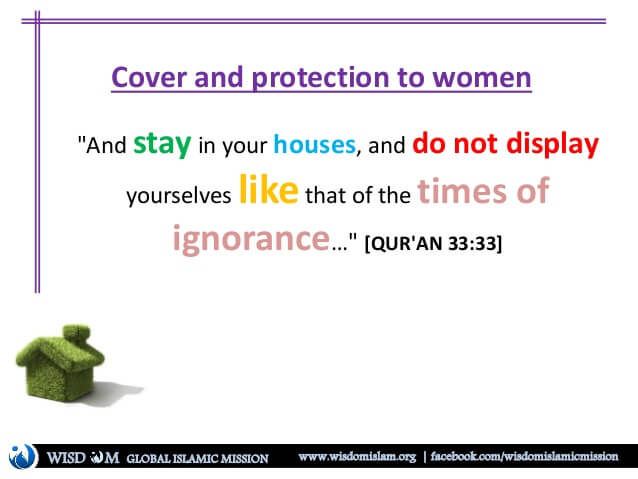
Women “… can build a career just like men …” in Islam
Women can build a career like a man – but only with the permission of the man in their life, and under certain conditions. If their husband forbids them from working, they cannot work. All rights are held at the whim of the man who is their controller.
Islam Question and Answer has this to say:
It is permissible for a woman to go out of her house for work, but that is subject to certain conditions. If they are met, it is permissible for her to go out. They are:
– That she needs to work in order to acquire the money she needs …
– The work should be suited to the nature of woman, such as medicine, nursing, teaching, sewing, and so on.
– The work should be in a place that is only for women, and there should be no mixing with non-mahram men.
– Whilst at work she should observe complete shar’i hijab.
– Her work should not lead to her travelling without a mahram.
– Her going out to work should not involve committing any haraam action, such as being alone with the driver, or wearing perfume where non-mahrams can smell it.
– That should not lead to her neglecting things that are more essential for her, such as looking after her house, husband and children.
Of course, in Western countries Muslim women are not sticking to these rules, and good on them. But that, of course, is not due to Islam.
Women “… can have the right to an inheritance just like men” in Islam
Women do have the right to inherit in Islam, but they inherit inherit a lesser proportion than a man. Women in Islam, for example, states:
Men and women have set and determined rights to receive their fair share of wealth …
The Qur’an states that men have the right to a greater share of the wealth than women, and that’s fair because men need more than women. Under that reasoning, women receiving a smaller share is fair. A widow, for example, gets only one-eighth of her late husband’s property. A son get’s double the share of a daughter.
The rules around inheritance in the Qur’an are quite complex, and in some situations they don’t work out either – the numbers don’t add up. Needless to say, women are not equal when it comes to inheritance.
“Education is mandatory upon women, just like men” in Islam
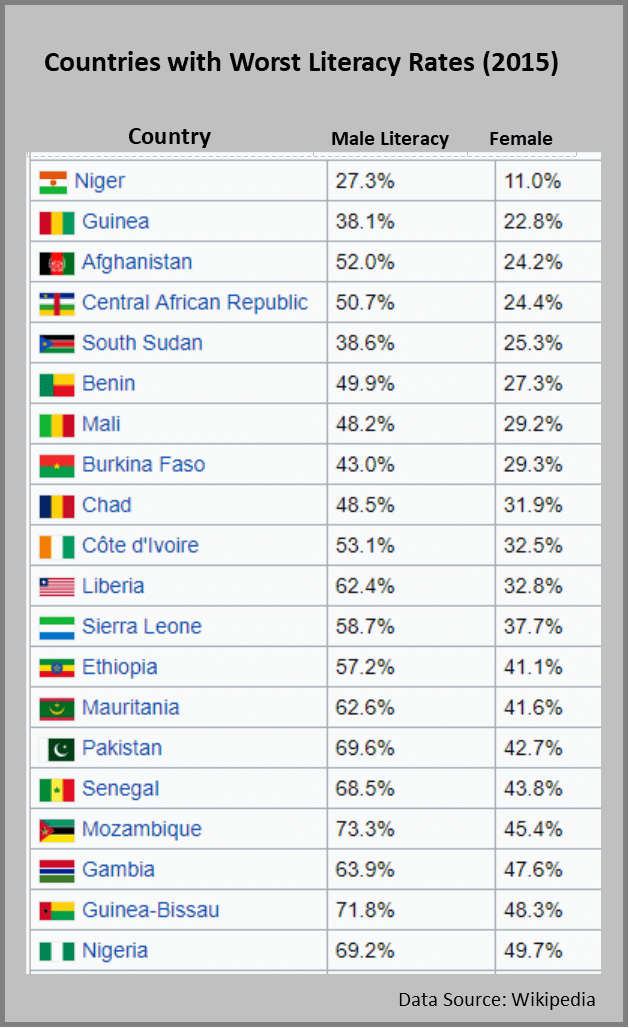 It’s true that the Qur’an tells Muslims to seek to learn their entire lives and other positive messages relating to education. All things being equal, girls are educated just as well as boys. In wealthier Muslim-majority countries like Saudi Arabia women are attaining tertiary qualifications at a higher rate than men, just like their sisters in the West.
It’s true that the Qur’an tells Muslims to seek to learn their entire lives and other positive messages relating to education. All things being equal, girls are educated just as well as boys. In wealthier Muslim-majority countries like Saudi Arabia women are attaining tertiary qualifications at a higher rate than men, just like their sisters in the West.
However, if a family cannot afford to educate all its children to their potential, it’s the boys that get the education. Two-thirds of the 800,000 people around the world over fifteen who are illiterate are women. The literacy rate is continuing to increase, but the proportion of the illiterate who are women is staying the same. The majority of countries with high rates of illiteracy are Muslim.
Further, Muslims are actually more likely to get a better education in countries where they are the minority.
So, Muhammad may have made it a duty upon his followers to learn, but it looks like Muslims aren’t doing that. Around the world, the religious group with the highest level of education is Jews. Christians come in second, followed by those with no religious affiliation. In fact, Muslims and Hindus are bottom equal when it comes to education.
Understanding the Error
Everyone wants their religion, their country, their family, or whatever else they identify with to be good. Most children realize at some point that their parents aren’t perfect. They usually work out that their country isn’t the best at everything, depending on the level of propaganda they’re subject to. Religion tends to hold onto people’s minds for longer though. Even when people recognize the faults of their own religion they either excuse them, justify them, or say something like, “but we’re better than the others.”
However, these days, mass and social media mean people are getting the information from places other than their own community, and thus more and more are rejecting the religion of their youth too. For some that takes longer than others.
The more one learns about religion the more one comes to understand that almost all of them show a deep hatred of women. The three biggest in the world, all worshiping the one god – Judaism, Christianity, and Islam – all began at a time of superstition when people simply didn’t have the knowledge we have now. All of them, for example, originally had strictures around interacting with menstruating women, especially in a religious context. Some still follow those.
It may or may not be true that for his time, Muhammad treated women better than they had been before. They certainly had some legal rights that Christian women didn’t have until more recently. In other situations, most non-Muslim women got rights ahead of Muslim ones, such as the right to vote.
However, whatever was the case in the time of Muhammad was centuries ago. What was acceptable then is not acceptable now. Islam is not feminist, and that will not change until Islam changes.
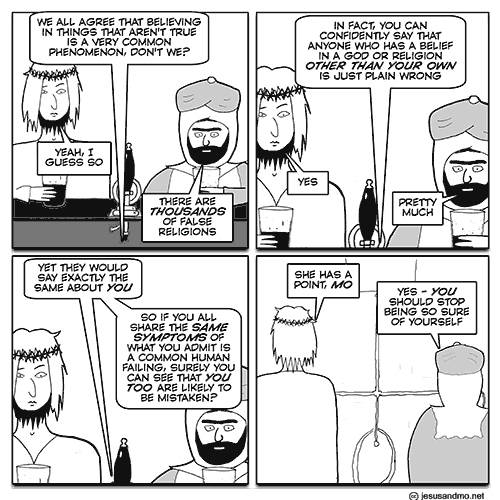
Jesus and Mo cartoon 28 Dec 2016
h/t: Jerry Coyne
If you enjoyed reading this, please consider donating a dollar or two to help keep the site going. Thank you.

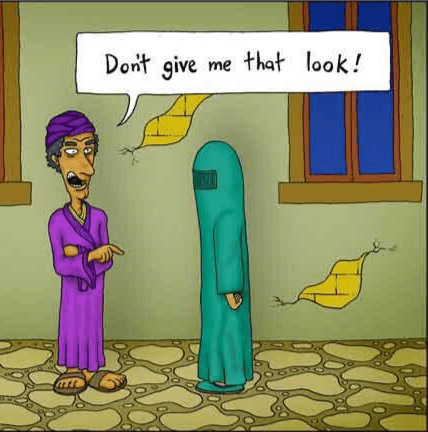
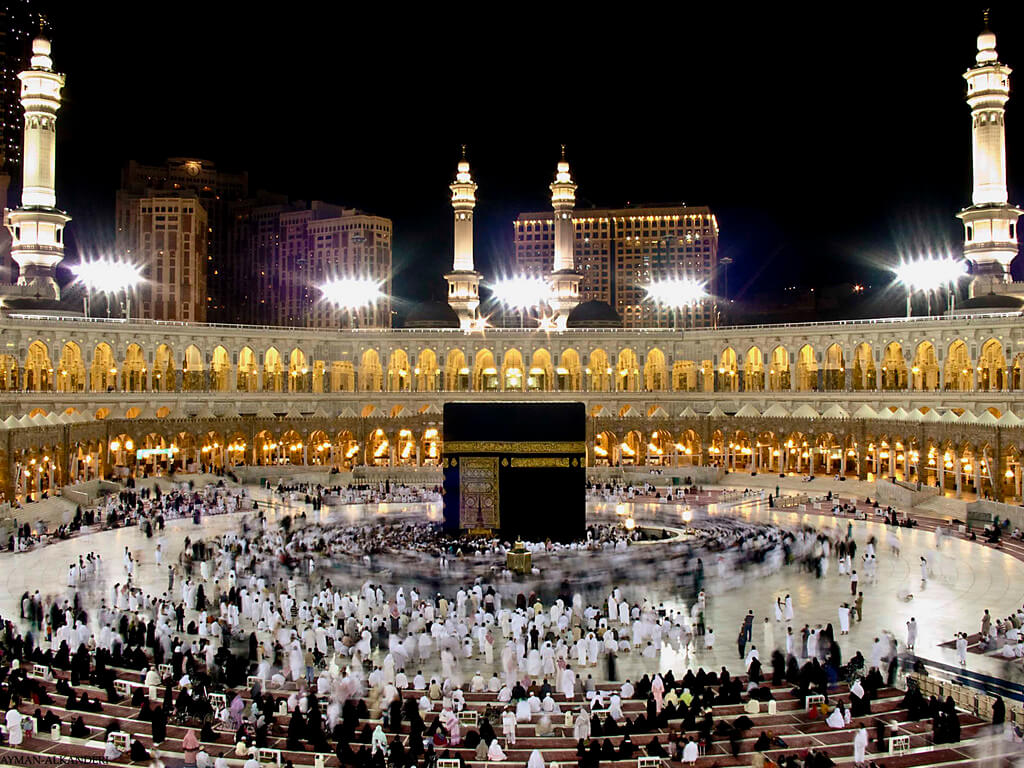
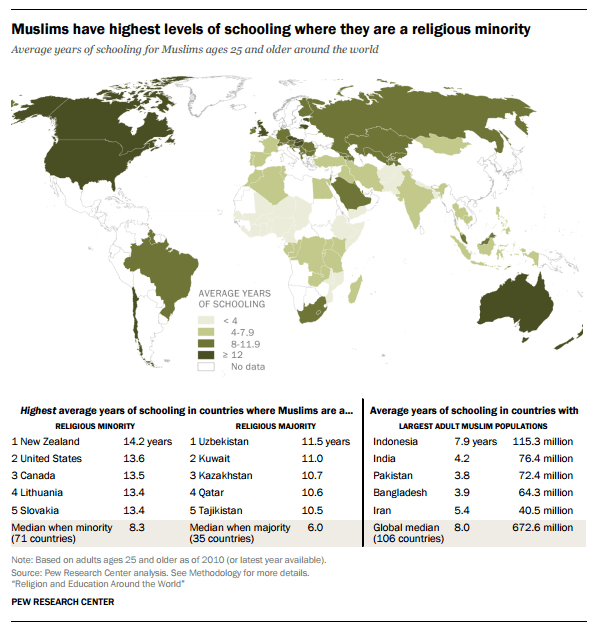
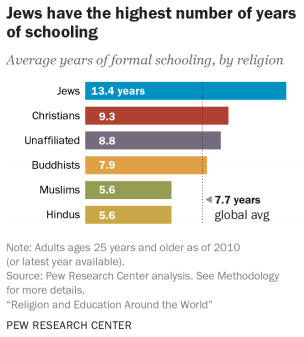
This is a very astute analysis of the matter and refutation of the claims advanced by the student and others.
My question is, If Islam is a feminist religion and this practicing Muslim woman (the one in the article linked to below) has developed a successful career on her own and is covering herself, where’s the beef? http://www.thedailybeast.com/banned-in-pakistan-a-muslim-porn-stars-sexual-crusade.
I also found this interesting link https://www.vice.com/en_us/article/yvxgmm/behind-the-rise-in-hijab-porn.
I don’t have a beef. My problem is with claiming something that’s not true.
Oops! Big mistake — it seems that Ms. Khalifa is a Lebanese Christian, not a Muslim https://www.washingtonpost.com/news/worldviews/wp/2015/01/06/the-miami-porn-star-getting-death-threats-from-lebanon/ ; however, my question remains
I feel like you think I have a problem with Islam. I don’t. Anyone wants to be Muslim (or anything else) that’s fine with me. That’s not what I have an issue with. The issue is trying to claim that Islam is feminist. If course there are any number of Muslim women who are feminists and all power to them. Many are doing a wonderful job reforming their religion from within too to make it more humanist. That’s great as well.
But the claim the Islam itself is feminist is not accurate. That’s where I call it our.
The beef is that if that lady were to go live in an Islamic country, she would not be able to pay her life-insurance premium…
“She blames this on culture rather than religion.” It seems to me that is the main argument defenders of Islam use in defense of the various oppressive or skewed practices in the Islamic world. Female dress codes, segregation and prohibitions, FGM, etc. However, it would be strongly supported only if Muslims were actively working to overcome those practices – which, I’m pretty sure is not happening.
Just as importantly, those Muslims that are working to overcome those things are actively fought against. I wrote a post some time ago (which was deleted from the site in a hack attack, and I don’t keep copies) about a couple of women- and LGBT-friendly mosques in South Africa. More conservative Muslims were doing all they could to stop them opening from trying to use council parking by-laws to death threats.
The recently opened secular mosque that recently opened in Berlin has been under police guard before it even opened because of threats from Muslim groups around the world. That Salafist mosque nearby that was attended by the guy who drove a truck into the Christmas Market last year hasn’t had any problems though.
Re “In the Quran, women and men are explicitly described as equal.” Why do religious apologists feel so comfortable in lying? You may be generous in claiming she was just mistaken, but making a claim about which one is unsure usually drives one to corroborate it before opening one’s big mouth. So, at the very least, she was lying about being sure of her point.
I gave her the benefit of the doubt because she’s just a kid, but you’re probably right.
I often find though that amateur religious apologists really believe what they’re saying. They’re taught a version of their faith that focuses on the good bits, and often just don’t know about the bad. It’s why that old saying (which you no doubt know!) is true – the best way to make an atheist out of a Christian is to get him to read the Bible.
There’s also that Pew survey about religious knowledge among USians – those who know the most are are atheists; those who know the least are conservative Catholics. They often rely on their priest for religious knowledge, and he only tells them what he wants them to know.
“They often rely on their priest for religious knowledge, and he only tells them what he wants them to know.”
Hate to say it, but that’s as bigoted and preposterous a statement as I can imagine.
No. It’s a matter of history. Your effing church KILLED people for translating the Bible into their own language for 1500 years. It KILLED people for questioning the Church’s interpretation of the Bible. The Office of the Inquisition still exists. It was renamed to something more innocuous sounding at the beginning of the last century, but it’s still there. The last pope was in charge of it before he became pope. It still excommunicates people for questioning the Church’s interpretation, which in your beliefs condemns them to BURN IN HELL FOR ETERNITY.
Don’t call me a bigot.
Words speak for themselves, so there’s no need for me to characterize them. Suffice to say some atheists haven’t entirely rejected the baggage from their Protestant upbringing.
j.a.m.: funny, I don’t find anything bigoted or preposterous in that statement. It seems self-evident. Or maybe I don”t have as good an imagination as you. Can you help me understand your comment?
If the shoe fits, wear it.
In that Pew survey, supposedly only one in three Catholics could name all four Gospels. It’s possible that the Church is keeping this information a secret, but a more plausible explanation is that it’s a junk statistic.
Well over half of the survey questions pertain to other faiths. So whatever these data supposedly tell us, it has nothing to do with inquisitions or dissension over Biblical interpretation.
No, it has to do with ignorance. Keeping the little people in their place, giving money to support a bunch of paedophile tax dodgers.
Sad.
So you think it’s okay that for centuries the Roman Catholic Church insisted that the only version of the Bible that could be used was THEIR translation, and they killed people who’s desire to read the Bible and get closer to their religion was so great they wanted to translate it into the vernacular? Of course, one of he things they discovered when they did that was that the person who did the Latin translation, Jerome, one of the greatest misogynists in history, had deliberately mistranslated bits to lower the status of women. The Protestants kept those bits because it suited them, so don’t try harking back to my Protestant youth. The murder of women via so-called “witch” trials by Protestants means I have no love for them either. Besides, it’s thanks to the Protestant Evangelicals that the world has to deal with Trump.
Pew doesn’t do “junk”. They’re one of the world’s pre-eminent survey organisations, which is why I use them. I wouldn’t, for example, use the survey organisation that reassured president Trump that his inauguration crowd was bigger than Obama’s.
That’s just any empty appeal to authority, not an actual argument as to why we should give any credence in this particular instance, or what we are supposed to learn from this exercise, much less how the specific results support your your specific hypothesis.
The survey was designed to measure the respondents’ knowledge of all faiths, but you are trying to use it to draw conclusions about their knowledge of their own faith. The actual questions deal more with trivia than substantive knowledge.
In any case, reducing the extremely complex subjective views and attitudes of living, breathing human beings to a set of multiple choice interviews conducted between minimum wage telemarketers and people who have nothing better to do than to spend time talking to telemarketers — produces a ton of junk.
j.a.m., you would be surprised. I grew up in a Catholic country and it always struck me how ignorant my co-pupils were of the Bible. I’m not at all surprised by that statistic.
Just try for yourself, ask who the four evangelists were, say, at work.
Don’t know how prevalent the following viewpoint is:
[According to Imam an-Nawawi, “If a woman leads a man or men in a congregational prayer, the prayer of the men is invalid. As for her prayer, and the prayer of the women praying with her, it is sound.” Within the household, if no qualified man is present, is the one exception for women to lead men in prayers.]
Not exactly gender equality to this observer.
Nice post as always.
Cheers Pliny. I’ve heard that too, but it’s not something I know a lot about. It’s a typical attitude in religion though – women will only do in an emergency. If you tease out the logic of that, it clearly doesn’t stand up.
No Heather, you disappoint me there. Islam not feminist? Next you’re going to tell us that the slave trade was not a humanitarian endeavour!
😀
Excellent post (as usual). One small detail though, I do not think Judaism is one of the three biggest religions. After Xianity and Islam, I guess it would be Hinduism.
You’re right about Hinduism being bigger, but that’s not what I meant.I didn’t word or punctuate that sentence very well at all! It was meant to be referring to the monotheistic ones, which, of course, doesn’t include Hinduism.
Yes, I sort of guessed that. The ‘Abrahamic religions’ would even be better, since I find calling Christianity monotheistic stretching it a bit ???? (Not just Jesus and the Father, but also these numerous saints with supernatural intercessory capabilities, not to mention the adoration of the Virgin Mary in some Christian sects (i.c. RCC)).
That’s bad theology.
Probably, but widelynpracticed.????
Yes, that would have been better. 🙂
Feminists have done a fantastic job at demoralizing sexist language and behaviour against women. But there is still not a place on Earth where sexism is completely abolished. All
countries have a place on the spectrum of sexism.
But, since the rise of feminism, and the growth of Islamophobia, media and others have found a convient form of demonizing the religion and region even further, whilst doing nothing/little about sexism which lies in their own countries, homes and cultures.
I am definitely NOT saying that Islam is not sexist, or that we should understand it as “sexist: Just like everywhere else”, no. This comment is to highlight sexism as a tool to justify Islamophobia in by the paternalistic Western elite.
You make a good point. There is nowhere that sexism is abolished, and those who are anti-Muslim use it as an excuse to abuse all Muslims. Of course, not all Muslims are sexist. However, There is a huge problem with sexism in Islam.
Agreed most (all) religions are sexist. But, major issues, such as ones shown in your maps and statistics, occur within countries that incorporate religion into their political and legal systems. This is the major issue. Similar to the time when most Western countries incorporated Christianity into their political and legal system e.g. homosexuality and womens sexual rights. And even further back, when superstition enabled the legal hanging of any woman accused of being ‘witches’ (which was an inherently sexist practice).
And, as these nations naturally evolved into more scientific rather than religiously structured societies, the law, politics, social attitudes and moral consciousness progressed. I believe, just as the West has recently (only a century since the womens vote in UK) become legally and socially less sexist, so will the Middle East through social and sexual liberations. And yes, these are already occuring, such as the ‘riots’ in Egypt 2011 and many new womens rights organisations opening in Yemen, Saudi Arabia and other nations of the Islamic-geopolitical states.
So, yes there is a huge problem of sexism in Islam, but the women that experience misogyny worst, are those whom live in countries where religion runs state politics and law. These are the nations and the women whom we should be focusing on. And, as people of the West, we should try our best to allow the social progression of each country to occur, without bringing the issue of Islamophobia to further oppress the Mulsim women of the West.
There is prejudice against Muslims in the West. That doesn’t mean we should ignore the issues in Islam in the West. Muslim women in the West have just as much right to live whatever life they want as their non-Muslim sisters. We should not ignore the issues many of them face in their own communities because of fear of encouraging Muslimophobia. As an analogy, imagine if nothing was ever done to help people of colour for fear of encouraging racism?
What helping actually does is make more people aware of the issues and increases understanding and support. These days, for example, a lot more people are supportive of marriage equality than even ten years ago. Talking about the issues same-sex couples face didn’t increase bigotry towards them, it reduced it. Phobias come from fear, which comes from lack of knowledge and understanding. At the moment there are a lot of people who think all Muslims are extremists. Talking more will mean more understand they’re just like the rest of us in terms of the range of personalities etc.
I suppose. But what issues do Muslim women have in the West? Issues unique to other women and women of colour? And what can we in the West do to help?
Many are still forced to comply with restrictions by other community members re dress, behaviour, schooling, marriage etc. Tens of thousands are even still forced to undergo FGM. Everything from forced hijab to honour killings still occurs.
Is any religion not patriarchal? Is any neutral? If there is, I am unaware of it. The only examples that come to mind are “sects” trying to drive a stake in the sand and are violating the basic tenants of the faith they proclaim by doing so.
And since men are scared shitless of the power of women, any religion that wan’t patriarchal is not at all likely to be adopted by the “powerful” in society. (Similarly, if Christianity didn’t endorse slavery, it would never have become the state religion of Rome and would therefore never have become a major religion.) Control of women seems to be a corner stone of all religions.
Islam is the religion of peace and equality.
Window AC LG zamil classic greeA
It was originally a religion of peace, and if all of the followers of Islam stuck with what Muhammad taught re peace in his early days, everyone would be a lot better off. However, as so often happens with a religion, as he obtained more followers the power that resulted made him more aggressive. He then moved and taught that his followers should take over the world by whatever means necessary.
Further, no matter what anyone says, I cannot accept in any circumstances that men and women are equal in Islam. Women do not have equal rights to men. Just look at inheritance law for a start. The weight of a woman’s testimony in court being considered half that of a man’s is particularly galling.
There is no religion in which men and women are equal, and in the vast majority it’s women who are the second-class citizens. Some are improving, but that’s because of the influence of secular morality and wouldn’t be happening if the religions were left to their own devices.
Wait … it was originally a religion of peace? So, the wars Mohammed fought were peaceful ones? I think too many people died to call it that.
I meant when Mohammed first started it. In his own lifetime it changed to a non-peaceful religion. I thought I made that clear in my comment, but obviously not. Sorry.